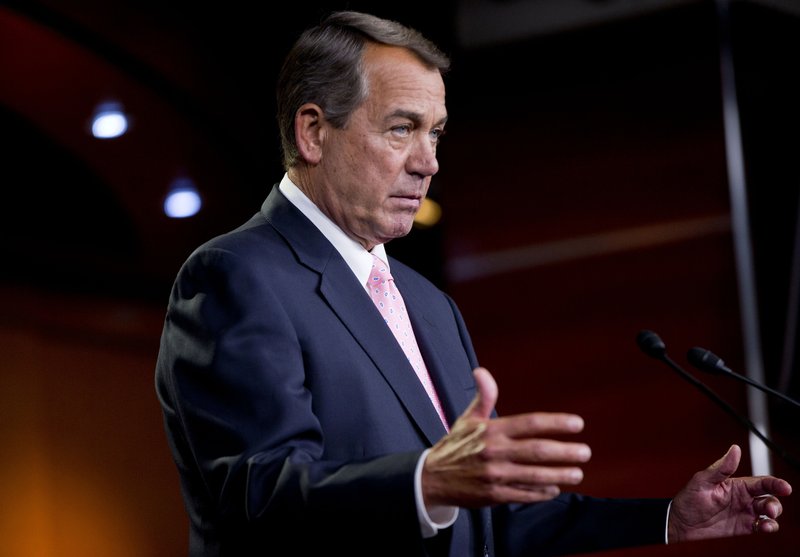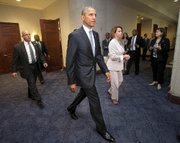WASHINGTON -- The Republican-controlled Senate passed trade legislation Wednesday that was long-sought by President Barack Obama but opposed by most lawmakers in his party.
The legislation granting fast-track trade-negotiation authority, which Obama hopes will aid completion of a trade agreement with Pacific nations, cleared the Senate on a vote of 60-38 and will go to the White House for the president's signature.
Sens. John Boozman and Tom Cotton of Arkansas, both Republicans, voted in favor of the measure, which had been derailed in the House two weeks earlier by Democratic lawmakers who argued it would cost American jobs.
A companion bill, to renew an expiring program of federal aid for workers disadvantaged by imports, passed by voice vote less than an hour later. A final vote on that measure in the House is expected today, lawmakers said.
Democrats have long supported the worker-aid program, and Republican leaders had combined it with the fast-track proposal to gain their support. After House Democrats defeated the worker-assistance plan as a means to block the fast-track authority, Republican leaders split the proposals into separate bills.
House Minority Leader Nancy Pelosi, D-Calif., who led the opposition, reversed her position Wednesday and said she would support the worker-assistance plan. Backing it will "open the door" to a fuller debate on a Trans-Pacific Partnership deal, she said in a letter to fellow House Democrats.
Wednesday's vote capped the end of a back-and-forth struggle that played out slowly over months, with Obama; Speaker John Boehner, R-Ohio; and Senate Majority Leader Mitch McConnell, R-Ky., on one side, and the union-backed Democratic leadership of the House and Senate on the other.
On Wednesday, McConnell, a frequent Obama critic, praised the president and the Democrats who joined the GOP on the measure sought by the president.
"We were really pleased to see President Obama pursue an idea we've long believed in," McConnell said. "We thank him for his efforts to help us pass a bill to advance it."
The measure would allow Obama to negotiate global trade deals that Congress could approve or reject, but not change. The administration was seeking the fast-track authority as it works to complete a round of trade negotiations involving 12 nations along both sides of the Pacific Ocean, including Japan.
The trade bill drew the support of 47 Republicans and 13 Democrats, while 31 Democrats, five Republicans and two independents were opposed. Republican Sen. Mike Lee of Utah missed the vote, as did GOP presidential hopeful Marco Rubio of Florida.
Sen. Orrin Hatch, R-Utah, and chairman of the Senate Finance Committee, praised the measure as "the most important bill that will pass the Senate this year" and one that will prove to be an aid to the economy.
Sen. Sherrod Brown, D-Ohio, countered shortly before the vote that it would be nothing of the sort. He said it would lead to "corporate handouts, worker sellouts," as he said had been the case with the North American Free Trade Agreement and other deals over the past two decades.
Many Democrats, U.S. labor unions and environmental activists said fast-track trade authority would undermine the ability of Congress to stop administration negotiators from working with large corporations to craft deals that might not be advantageous to workers or the environment.
While the measure opened a breach between the Democratic president and several lawmakers in his party, the White House tried to cast a soft light on the division.
"We have Republican majorities in Congress working closely with Democratic minorities in Congress to build bipartisan support for legislation that then arrives on the desk of a Democratic president," said White House spokesman Josh Earnest. That's how policy should be made "in an era of divided government," he said.
Meanwhile, the Republican House speaker called the trade votes "a big win for the American people."
"Trade is good for American farmers, for manufacturers and small businesses," Boehner said.
And both senators from Arkansas stressed in statements Wednesday that Congress will retain oversight of any trade agreement the president negotiates.
"To say that Congress is giving the current president, or the next, the ability to unilaterally enter into any agreement is not accurate," Boozman said. The fast-track authority "creates transparency in trade negotiations. The president must consult closely with Congress before, during and after negotiations."
Cotton said the legislation ensures Americans have a transparent view of the trade process.
"Rest assured, I will fight back against any misuse of this economic tool," Cotton said.
Arkansas Gov. Asa Hutchinson, who also favored fast-track legislation, issued a statement praising Wednesday's vote.
"During my recent trade mission to Europe, I heard first-hand how this country's lack of a better trade agreement with Europe is costing us jobs and business, especially in the auto industry," he said. "This trade authority is good for the United States and good for Arkansas. It will create jobs here, and I strongly support it."
The 12 nations participating in the current Pacific-based talks account for 40 percent of the world's economy, and include Japan, Malaysia, Australia, Canada and Mexico. Obama has said a ratified Pacific-rim pact will reassert the United States' significant role in international standards for commerce, treatment of workers and the environment.
American allies in Asia welcomed the Senate vote, which cleared the way for a final round of negotiations over the trade pact. Japan's minister responsible for trade negotiations, Akira Amari, said Wednesday's vote could open the way for a deal as soon as next month.
"It's possible we could have a ministerial-level meeting in July and conclude a broad agreement," he said.
Any agreement would then require putting legislation in each country into effect, followed by approval there, which could take months.
For Obama, the deal represents an important element of his so-called pivot to Asia to help maintain U.S. influence as countries grow increasingly dependent on trade with China. For American allies, it offers the political cover to commit to trade concessions, removing the risk that Congress might reject the negotiated deal.
China is not among the 12 nations negotiating the deal. It was initially wary of the the Trans-Pacific Partnership, seeing it several years ago as potentially giving an advantage to American allies' business over Chinese companies in U.S. markets. But those objections have faded as China has begun pursuing its own regional trade agreements with East Asian neighbors.
"Even if [the Trans-Pacific Partnership] is done, I don't think it will pose any threat to China -- we follow our own efforts," said He Weiwen, a former Chinese Commerce Ministry official who is now a director of the influential China-United States-European Union Study Center at the China Association of International Trade in Beijing.
Information for this article was contributed by Charles Babington and David Espo of The Associated Press; by Keith Bradsher of The New York Times; by Carter Dougherty, Kathleen Hunter and Billy House of Bloomberg News; and by Sarah D. Wire of the Arkansas Democrat-Gazette.
A Section on 06/25/2015

